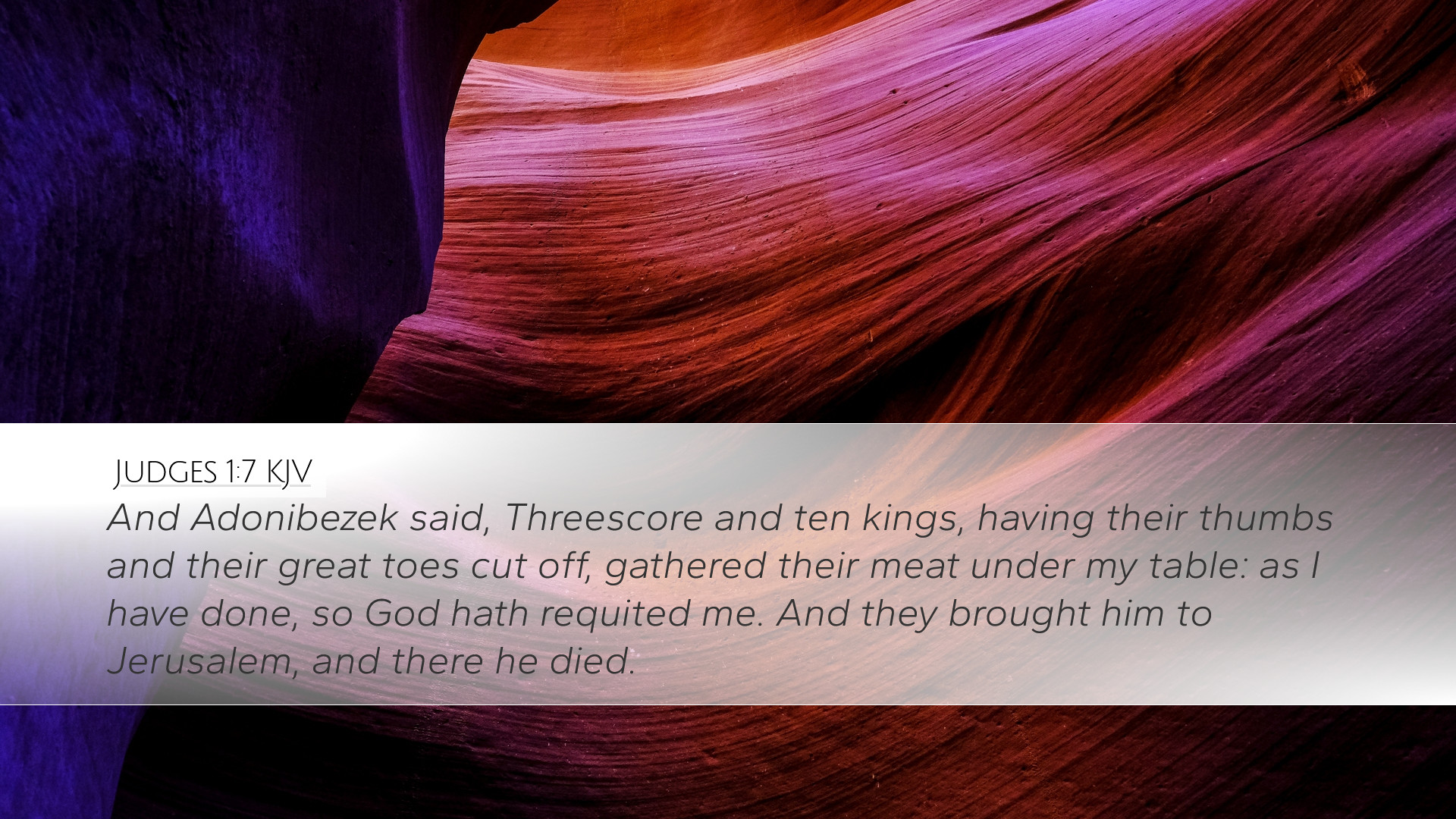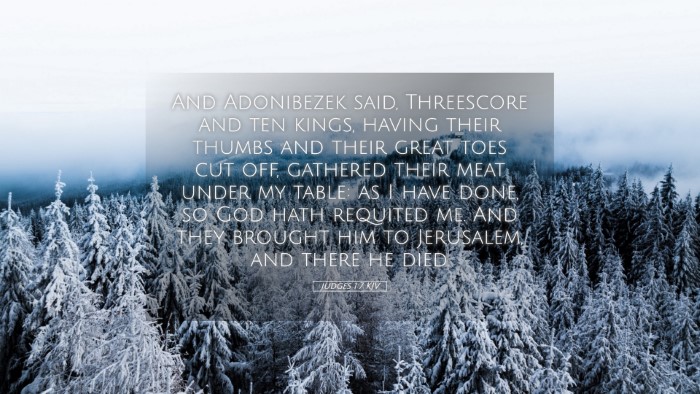Commentary on Judges 1:7
Judges 1:7 states, "And Adoni-bezek said, 'Seventy kings, with their thumbs and their great toes cut off, used to haul in under my table; as I have done, so God has repaid me.' And they brought him to Jerusalem, and he died there."
Historical Context and Analysis
Understanding the historical context of this verse is crucial for interpretation. Adoni-bezek, the king of Bezek, represents the cruelty and ruthlessness prevalent among ancient rulers. The verse highlights the cycle of violence that pervaded the region and how God’s justice was enacted. Adoni-bezek’s recounting of his own practices reveals a life marked by brutality towards conquered foes.
Insights from Public Domain Commentaries
Matthew Henry's Commentary
Henry emphasizes the principle of divine retribution depicted in this verse. He notes that "the measure you use will be measured to you," indicating that Adoni-bezek’s punishment mirrors his own deeds. The cutting off of thumbs and toes not only signifies physical incapacitation but symbolizes the total humiliation he inflicted upon his conquered enemies. This act serves to remind the reader that God’s justice will ultimately prevail over human wickedness.
Albert Barnes' Notes
Barnes provides a detailed exegesis, stressing that Adoni-bezek’s acknowledgment of divine recompense is noteworthy. He points out that even a pagan king recognized a moral order in the universe governed by a just God. Barnes writes, "Though Adoni-bezek did not worship the God of Israel, he nonetheless acknowledges that his own actions have led to his downfall, displaying a perverse understanding of justice." This moment signifies an unavoidable truth that no one escapes the consequences of their actions.
Adam Clarke's Commentary
Clarke offers a theological perspective, interpreting Adoni-bezek’s fate as a manifestation of God's sovereignty. He posits that the act of capturing Adoni-bezek and inflicting upon him the same punishment he dealt to others serves as a deterrent to future oppressors. Clarke elaborates, "The Lord is not blind to the deeds of the unjust. This account serves not only as historical record but also as a moral lesson for all who exercise power."
Key Themes and Lessons
- Divine Justice: A central theme in Judges 1:7 is the retributive justice of God. Reflecting on how God upholds justice reinforces the moral imperative for believers to act rightly, knowing that God observes all dealings.
- Consequences of Sin: Adoni-bezek’s fate serves as a stark reminder that actions have consequences. The very cruelty he showcased was returned to him, illustrating the truth that “as a man sows, so shall he reap.”
- The Role of Suffering: Adoni-bezek's suffering at the hands of the Israelites provides insight into how God can use one’s suffering to communicate deeper truths about justice, mercy, and redemption.
Theological Implications
This verse provides fertile ground for theological reflection, particularly regarding the nature of God’s justice. It challenges contemporary believers to ponder the seriousness of sin and the certainty of divine accountability. Through the lens of Adoni-bezek’s life and subsequent downfall, the narrative calls for introspection about how power is wielded and the potential consequences of tyranny.
Applications for Today
For pastors and ministers, this passage offers multiple applications:
- Encourage congregations to embody justice tempered with mercy, avoiding the pitfalls of pride and oppression.
- Examine personal and collective actions, reflecting on the impact of their deeds in light of God’s eternal principles.
- Use this narrative to illustrate the character of God, reminding believers that He is actively engaged in the matters of justice and righteousness.
Conclusion
Judges 1:7, viewed through the lens of historical, theological, and moral perspectives, provides rich material for reflection and exhortation. The interplay of divine justice and human action beckons scholars, students, and all followers of Christ to engage deeply with the text, deciphering the implications for individual lives and broader societal structures. The example of Adoni-bezek serves as both a warning and a reminder of God’s unwavering commitment to justice.


